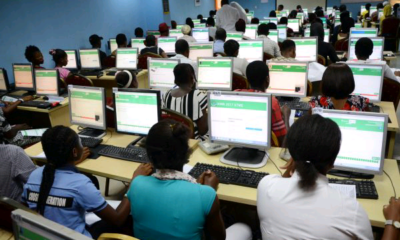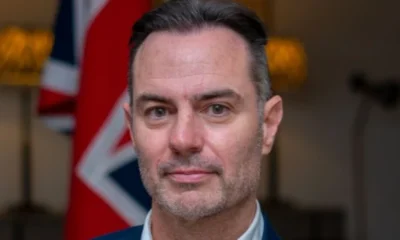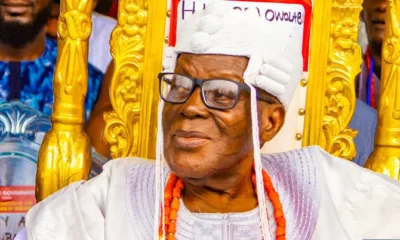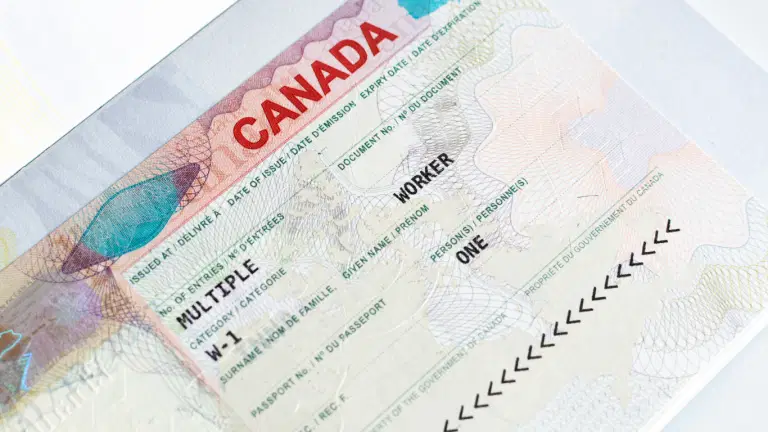The Independent National Electoral Commission may be forced to use serving members of the National Youth Service Corps to monitor political parties’ direct primaries across the country if the President, Major General Muhammadu Buhari (retd.), signs the Electoral Act Amendment Bill.
This is because of the large number of personnel that will be needed to monitor the direct primaries across the 8,809 awards in the 36 states of the federation and the Federal Capital Territory.
The INEC National Commissioner and Chairman, Information and Voter Education Committee, Mr Festus Okoye, confirmed this in a chat with one of our correspondents on Sunday.
Okoye said it would be premature to speculate since Buhari had not yet signed the bill. He also said certain factors would be considered.
He admitted that the staff requirements for primaries would “change if the President assents to the bill.”
The INEC spokesman said some political parties might consider conducting primaries at the ward level, while others might use the local governments or senatorial districts as the criteria for primaries
Responding to a question, Okoye said, “Some parties may adopt the 8,809 registration areas (wards) of the commission for their primaries. Some may use the 774 LGAs for their primaries. Some may cluster their primaries around the senatorial districts.
“Some may use the state capitals and have a differential period when people from a particular local government area can vote. These things will be set out in the guidelines that will be designed by the parties and filed with the commission at least 14 days before the conduct of the primaries.
“When the bill is signed into law, the commission will meet and take a position on how to proceed with each strand and segment of the process. We may use our staff members for some of the primaries. We may use lecturers of federal tertiary institutions for some. We may use staff members of federal agencies and commissions, and we may use corps members. It depends on the track designed and submitted by the parties.”
Also speaking with The PUNCH, a retired INEC director, Oluwole Osaze-Uzzi, said the use of corps members would be the most feasible if the President assents to the bill.
Osaze-Uzzi, who said mandatory direct primaries would increase the cost of elections, stated that the NYSC remained the largest single pool of personnel available to INEC.
“It is most likely that INEC will use corps members because the NYSC is the single largest pool of personnel available to the commission. But more importantly, is the cost implication. The cost of conducting elections will be astronomical,” he stated.
The commission, according to its 2019 project plan, hired about 2.7 million ad hoc officials for the general elections, many of whom were corps members.
The document, which was obtained by The PUNCH, showed that N630m was spent on monitoring political party congresses and primaries in 2018. About N104.8m was spent on monitoring governorship, senatorial, state constituency, and federal constituency primaries, while the presidential primary cost N27.8m.
Attempts to get a response from the NYSC on the proposal proved abortive as its spokesperson, Mrs Nike Adeyemi, did not respond to inquiries.
The National Assembly had last week passed the Electoral Act Amendment Bill, which makes it compulsory for all political parties to conduct their primaries using the direct method.
The Peoples Democratic Party and the governors of the All Progressives Congress have rejected the provision for direct primaries, while the National Assembly remains adamant.
This week, the bill is expected to be transmitted to Buhari for assent upon his return from South Africa. However, governors have begun making moves to ensure that he does not sign it.
But the House of Representatives and some senators have threatened to veto the President if he fails to sign the bill within 30 days.
Vice-President Yemi Osinbajo had said last week that many of the National Assembly members believed the best way for them to win re-election was by the direct primary method, which would not be easily manipulated by their state governors.
“The reason (for the endorsement of direct primaries by the National Assembly) as it emerged from our discussions at the tripartite committee was that some legislators felt that state governments had completely taken over party congresses, and other legislators, as stakeholders, stood no chance of a fair contest in the primaries if all potential delegates and actors have already been spoken for,” Osinbajo said.
Meanwhile, political parties under the aegis of the Inter-Party Advisory Council, have again kicked against the use of direct primaries
The National Publicity Secretary of IPAC, Major Agbo, told The PUNCH that it could affect smaller parties, which did not have the finances.
He said, “The passage of the Electoral Act due to pressure from the electorate is a welcome development. The wishes and aspirations of Nigerians prevailed at last even though they tried to scuttle it initially.
“However, the inclusion of the clause on direct primaries is meant to stifle smaller parties without resources. The resources required to mobilize all party members for the primaries are enormous and will effectively put the smaller parties in difficulty, especially as the parties do not receive any funding from the government as tenable in other climes.
“This is not healthy for our democracy as it gives undue advantage to the bigger parties at the expense of the smaller ones. Nigerians should insist that this clause be removed before the bill is assented to.”
In a related development, the Senate has expressed optimism that Buhari will sign into law the 2010 Electoral Act (amendment) Bill, 2021, which will be transmitted to him this week.
The spokesman for the Senate, Ajibola Basiru, stated this in an interview with one of our correspondents in Abuja.
He said only enemies of democracy would envisage that the President would not assent to the bill.
“The President has not rejected direct primary and has not told anybody that he will not sign the bill,” Basiru stated.
Asked if the federal lawmakers would carry out their threat to veto the President if he declines assent to the bill, Basiru said he did not believe in assumptions.
He stated, “I don’t deal in theories. I don’t deal in hypotheses. I won’t answer any question on whether the National Assembly will veto the President or not. It will be an insult on the President for anybody to be thinking that he will withhold assent to the bill.
“We don’t have any problem with the President. We have done our work. Let anybody go and tell the President not to sign it. Go ahead. When we get to the bridge, we will know how to cross it.
“It is presumptuous for anybody to assume that he will refuse assent to the bill. It is not even healthy for democracy. It is only negative people, who are enemies of democracy, who will think like that.”
Meanwhile, the Executive Director, Civil Society Legislative Advocacy Centre, Auwal Musa Rafsanjani, has said the direct primary method is better than the indirect system.
Rafsanjani, in an interview with one of our correspondents, however, said the National Assembly should not impose the direct primary method on all political parties without due consultation.
“The positive side of the direct primary method is more than the indirect, because of the ways and manners in which it affects political parties negatively. The National Assembly should get the support of other political parties before imposing the method on them,” he said.
The National Publicity Secretary of the Peoples Democratic Party, Kola Ologbondiyan, also said the party was against the imposition of a sole mode of primary on all the parties.
Ologbondiyan stated, “Our position in the PDP has always been that the parties should be allowed to determine the type of primary they wish to adopt.
“The National Assembly cannot force a singular process on all the political parties.”
The PDP spokesman, however, said the party had yet to determine the method it would adopt to elect the candidates, who would fly its flags in the 2023 general elections.
“We have not adopted any mode of primary for the 2023 general elections. We should be able to agree on that by the end of the year,” Ologbondiyan added.”

 BIG STORY1 day ago
BIG STORY1 day ago
 BIG STORY4 days ago
BIG STORY4 days ago
 BIG STORY2 days ago
BIG STORY2 days ago
 BIG STORY1 day ago
BIG STORY1 day ago
 BIG STORY1 day ago
BIG STORY1 day ago
 BIG STORY3 days ago
BIG STORY3 days ago
 BIG STORY2 days ago
BIG STORY2 days ago
 BIG STORY3 days ago
BIG STORY3 days ago
























